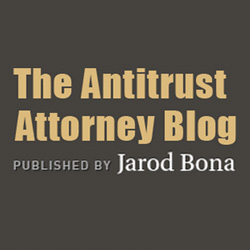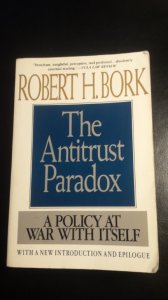 FTC Commissioner Joshua Wright recently announced his retirement from the FTC Commission to go back to George Mason University School of Law. But he did not go out quietly.
FTC Commissioner Joshua Wright recently announced his retirement from the FTC Commission to go back to George Mason University School of Law. But he did not go out quietly.
Not only was he incredibly productive during his FTC tenure, but he left right after the Federal Trade Commission issued “Principles Regarding ‘Unfair Methods of Competition’ Under Section 5 of the FTC Act.” As you may recall, this was one of his express goals when he first began his work at the FTC.
What is Section 5 of the FTC Act?
Section 5 of the FTC Act declares that “unfair methods of competition in or affecting commerce” are unlawful.
What does that mean?
For most of the FTC’s existence, those of us advising antitrust clients had to piece together inferences from a mere handful of cases that have addressed the Act, while at the same time trying to parse speeches and FTC activity by whatever set of commissioners were in power.
There were some cases—mostly decided in the 1980s—that seemed to limit the FTC’s power under the Act, but the authority is sparse. And the FTC seems to change its mind depending upon who is in power.
That is a problem when you have a client that wants to know if they can undertake some sort of activity. It is even more difficult when your client is already under investigation by the FTC and you have to try to explain to them that the standard of whether they have violated the FTC Act—regardless of the legality of their actions under the Sherman and Clayton Acts—would be determined by their adversary, the FTC.
We could advise the client that some prior cases suggested limiting principles, but it was, in reality, entirely unclear how a court would ultimately approach an enforcement action. And many courts might prefer to defer to the governing agency in interpreting the law the agency administrates.
This open-ended statute, of course, offered the FTC great leverage in its investigations and actions because its targets couldn’t effectively predict the likely scope of Section 5 of the FTC Act. This leverage can lead to forced settlements for targets that don’t know the standard by which the agency will judge them.
And the FTC had not issued any significant guidance about how it would enforce Section 5 of the FTC Act. It was clear to most people in the antitrust community that the Act was potentially broader than the Sherman and Clayton Acts—the traditional antitrust statutes—but the extent and scope were unclear.
(As an aside, the FTC does its antitrust enforcement through this FTC Act, even if it involves existing antitrust statutes, so the only real issue is how much broader is the FTC Act than the other antitrust statutes. The FTC refers to this as their “standalone” Section 5 authority).
The scope of Section 5 of the FTC Act was an important issue because when it comes to competition enforcement there is a very fine line between anticompetitive activity and strong procompetitive activity. Indeed, it isn’t always clear whether a particular type of business practice is either strongly procompetitive or actually anticompetitive.
So if Section 5 of the FTC Act is too broad it might deter conduct that in fact helps competition a great deal, which would undercut the purpose of the statute itself. This is a recurring problem for antitrust enforcement.
 The Antitrust Attorney Blog
The Antitrust Attorney Blog










